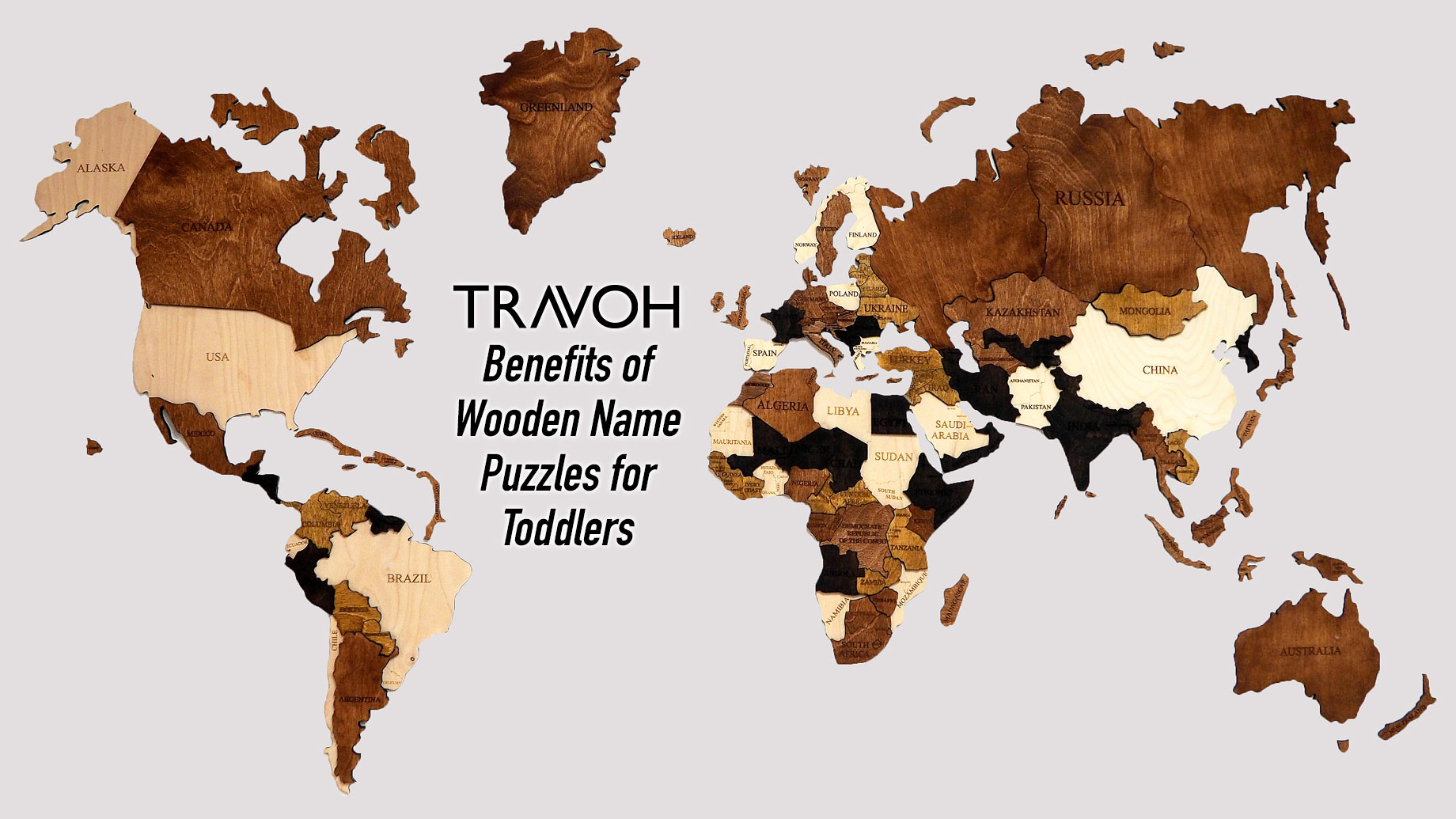
Wooden name puzzles have gained popularity among parents and educators as engaging and educational toys for toddlers. With their simple yet interactive design, these puzzles offer more than just fun. They play a significant role in early childhood development, enhancing various skills that are essential for young learners. This article explores the multifaceted benefits of wooden name puzzles for toddlers on the website https://voopuzzle.com/, highlighting how they contribute to cognitive, physical, and social-emotional growth.
1. Personalized Learning Experience
One of the primary advantages of wooden name puzzles is their personalized nature. Each puzzle is typically crafted to feature the child’s name, making it unique to them. This customization not only adds a personal touch but also helps in name recognition. As toddlers repeatedly engage with their name puzzle, they become more familiar with the letters and the sequence of their own names. This type of personalized learning fosters a deeper emotional connection with the toy, encouraging children to engage with it more frequently.
Additionally, when a child sees their name in a tangible form, it enhances their understanding of self-identity. The process of recognizing and spelling their own name promotes a sense of ownership and pride, making learning a joyful experience.
2. Development of Fine Motor Skills
Fine motor skills are crucial for a child’s overall development as they involve the coordination of small muscles in the hands and fingers. Wooden name puzzles are designed with large, easy-to-grasp letters that fit into specific slots, encouraging children to manipulate the pieces. The act of picking up, rotating, and placing these wooden letters into the correct positions helps to strengthen finger muscles and improve hand-eye coordination.
This skill development is vital for future tasks such as writing, drawing, and even simple daily activities like buttoning clothes or using utensils. As children practice fitting the letters into the puzzle, they learn to control their hand movements with precision, laying the groundwork for more complex tasks that require dexterity.
3. Introduction to Letter Recognition and Phonics
Wooden name puzzles serve as an excellent introduction to the alphabet. When children repeatedly handle the individual letters of their name, they begin to associate each letter with its shape and sound. This tactile and visual learning method aids in letter recognition, an essential precursor to reading. By familiarizing toddlers with the shapes and sounds of letters, these puzzles lay the foundation for early literacy skills.
Parents and educators can also use name puzzles as tools for teaching phonics. For example, by saying the letter’s name and its corresponding sound as the child places it in the puzzle, they reinforce the connection between the visual and auditory aspects of learning. This interactive approach can spark an interest in language and reading at an early age.
4. Encouragement of Problem-Solving Skills
Problem-solving is a critical skill that toddlers develop through play. Wooden name puzzles provide a safe and structured environment for children to experiment and figure out how pieces fit together. As they attempt to match each letter to its correct position, they learn to recognize patterns, analyze shapes, and think logically. These are all fundamental aspects of problem-solving that will serve them well in various academic and life scenarios.
When a toddler successfully completes a puzzle, they experience a sense of accomplishment, which boosts their confidence. This encourages them to tackle more complex puzzles and challenges, promoting resilience and a growth mindset.
5. Enhanced Memory and Concentration
Playing with wooden name puzzles requires toddlers to focus on the task at hand, enhancing their concentration and memory. As they remember where each letter piece fits and in what order, they exercise their short-term memory. Over time, this repetition strengthens their ability to recall information, which is essential for learning new concepts.
The act of concentrating on a single task for an extended period helps toddlers develop the ability to stay focused, a skill that is increasingly important in a world filled with distractions. Name puzzles, with their simple yet engaging design, hold a child’s attention long enough to build these foundational cognitive skills.
6. Promotion of Hand-Eye Coordination
Hand-eye coordination is another crucial skill that toddlers develop through the use of wooden name puzzles. To successfully place the puzzle pieces in their corresponding slots, a child must visually track the piece and guide it into position using their hands. This activity requires the simultaneous engagement of vision and fine motor control, making it an effective exercise for developing hand-eye coordination.
Improving hand-eye coordination is essential for a variety of future tasks, such as playing sports, handwriting, and even activities like typing or using digital devices. The early practice that toddlers get through puzzles prepares them for these more complex tasks as they grow.
7. Support for Spatial Awareness
Spatial awareness is the ability to understand the relationship between objects and their positions in space. Wooden name puzzles help toddlers develop this skill as they learn to judge the size, shape, and orientation of each letter piece. The act of fitting each letter into its correct slot requires spatial reasoning, which is an important aspect of mathematical thinking.
As toddlers manipulate the puzzle pieces, they learn to estimate distances and recognize shapes, enhancing their spatial perception. This foundation in spatial reasoning can lead to improved abilities in subjects like geometry, art, and even navigation skills later in life.
8. Boosting Language and Vocabulary Skills
Wooden name puzzles are more than just tools for letter recognition; they also help in expanding a toddler’s vocabulary. As children become familiar with the letters in their name, parents can introduce additional words and concepts related to each letter. For example, if a child’s name starts with “B,” the parent can introduce words like “ball,” “bear,” or “boat,” enriching the child’s vocabulary.
Engaging in conversations around the puzzle pieces encourages toddlers to ask questions and express their thoughts, promoting language development. This type of interactive play strengthens the child’s communication skills, making them more comfortable with verbal expression.
9. Encouragement of Independent Play
Wooden name puzzles are excellent tools for fostering independent play. Because they are straightforward and easy to use, toddlers can engage with them on their own without much adult supervision. Independent play is crucial for building a child’s confidence, as it allows them to explore, experiment, and learn at their own pace.
The ability to solve a puzzle without assistance gives toddlers a sense of autonomy and achievement. It teaches them to be self-reliant and helps them understand the value of perseverance. This early practice of self-directed learning sets the stage for lifelong learning and curiosity.
10. Safe and Eco-Friendly Play Option
Another significant benefit of wooden name puzzles is that they are typically made from natural, non-toxic materials. Unlike plastic toys that may contain harmful chemicals, wooden puzzles are often crafted from sustainable wood and finished with child-safe paints and varnishes. This makes them a safer option for toddlers, who tend to put toys in their mouths.
Moreover, wooden name puzzles are durable and long-lasting. They can withstand rough play and, unlike plastic toys, do not easily break or wear out. This makes them an eco-friendly choice, as they are less likely to end up in a landfill compared to their plastic counterparts.
11. Facilitating Parent-Child Bonding
Playing with wooden name puzzles can be a shared activity between parents and children, providing an opportunity for quality bonding time. As parents guide their toddlers through the puzzle, they can offer encouragement, celebrate small achievements, and introduce new learning concepts. This positive interaction strengthens the parent-child relationship and creates a supportive learning environment.
Parents can also use these moments to observe their child’s learning style, preferences, and areas of strength or difficulty. This insight helps parents tailor future learning activities to better support their child’s development.
12. Promoting Creativity and Imagination
While name puzzles are structured in design, they also offer opportunities for creativity. Toddlers can use the wooden letters to spell out other simple words or arrange them in different patterns. This open-ended play encourages creative thinking and allows children to experiment with letters in various ways.
For instance, parents can introduce games where the child has to spell a new word using the letters from their name or ask them to create letter shapes using the pieces. This playful approach not only keeps children engaged but also nurtures their imagination and problem-solving abilities.
13. Building Self-Esteem and Confidence
Completing a wooden name puzzle, especially without assistance, gives toddlers a great sense of accomplishment. The challenge of figuring out where each piece goes and successfully placing it in the correct spot boosts their self-esteem. Each time they solve the puzzle, their confidence grows, making them more willing to try new challenges.
This boost in self-esteem is crucial for early childhood development, as it influences how children approach learning and problem-solving throughout their lives. When toddlers feel capable and proud of their achievements, they develop a positive attitude toward learning and self-growth.
14. Transition to Geography and World Awareness
As toddlers grow, introducing more complex puzzles, such as world maps with country names, can be a great next step. These intermediate puzzles build on the skills developed with wooden name puzzles by introducing new concepts like geography and global awareness. World map puzzles help children recognize the shapes and locations of different countries, understand their spatial relationships, and learn the names of various places.
By engaging with these puzzles, children start to grasp the idea of a world beyond their immediate environment. It can also be a fun way to introduce them to cultural diversity, as parents or educators can share interesting facts about each country while assembling the puzzle. This combination of hands-on learning and storytelling fosters curiosity about the world, preparing young learners for more in-depth studies of geography and social studies in the future.
With the progression from personalized name puzzles to world map puzzles, children benefit from a gradual increase in complexity that keeps them challenged and engaged, building their cognitive and spatial skills in an enjoyable way.
Final Thoughts
Wooden name puzzles are more than just toys—they are valuable educational tools that support various aspects of early childhood development. From enhancing fine motor skills and spatial awareness to boosting language skills and promoting independent play, these puzzles offer a wealth of benefits for toddlers. By incorporating such toys into a child’s play routine, parents and educators can foster a love for learning and lay a strong foundation for future academic and life success.
